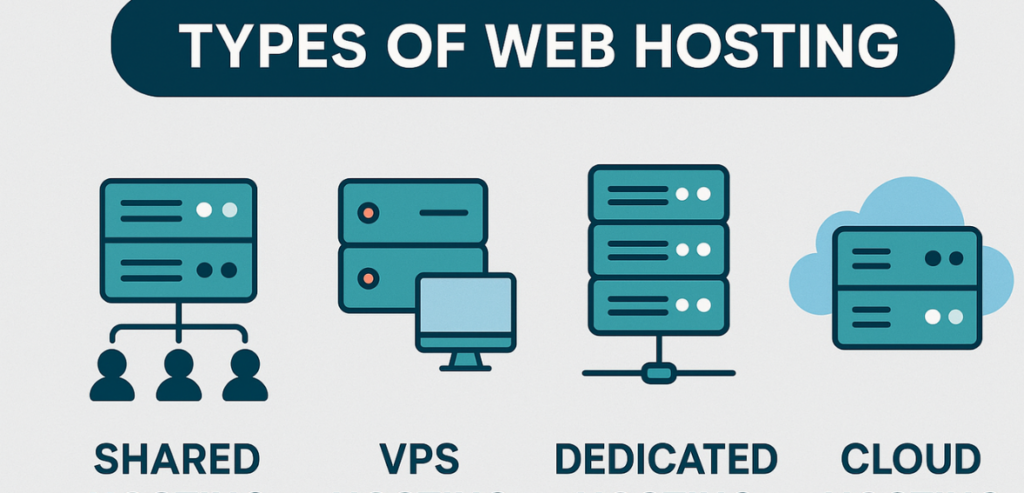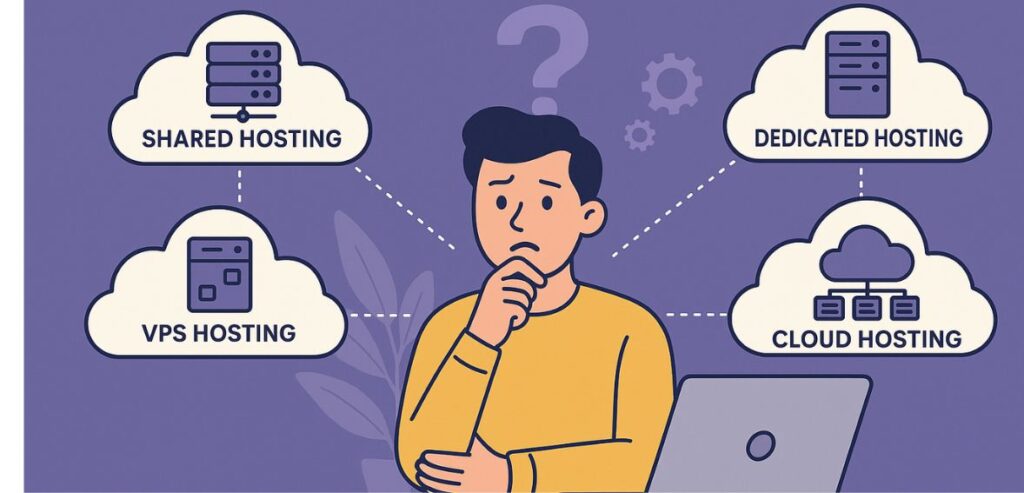In today’s digital era, selecting a proper web hosting solution is fundamental to website performance, security, and scalability. As we approach 2025, technologies for web hosting are still being developed, bringing more advanced possibilities for businesses and individuals. In this in-depth guide, the most common web hosting types—shared, VPS, dedicated, and cloud hosting—are discussed, along with their benefits, drawbacks, and best use cases.
Understanding Web Hosting Fundamentals

Before exploring types of hosting, it’s crucial to know what web hosting is. Web hosting is a service that enables individuals and organizations to website on the World Wide Web. Web hosts are businesses that offer the technologies and services required for websites to be accessible on the internet, hosting website files on high-powered computers referred to as servers. When a user types your domain name into their browser, the browser communicates with your web host’s server, which sends your website files to the visitor’s computer. How well this happens depends mostly on the hosting you have.
What Are the Different Types of Web Hosting?
Here are different types of web hosting:

1. Shared Hosting: The Entry-Level Solution
Shared hosting provides the fundamental and inexpensive solution for web hosting services among different companies. Shared hosting servers house multiple websites using the same server resources, including RAM, CPU as well and storage space. The server maintenance expenses are distributed among all users due to this approach, which enables significant cost reduction.
Key Features of Shared Hosting
Modern shared hosting providers implemented robust resource compartmentalization systems, which stopped the resource-overload issues that used to affect earlier shared platforms. Modern Internet hosting firms have developed security enhancements that integrate powerful firewalls and automated malware detection along with enhanced SSL protection features. Current shared hosting interfaces, including panel, Pesky, and proprietary control panels, have experienced advanced user-friendliness and feature enhancement. Every vendor in the market provides daily or weekly automated backup services as a standard feature. Basic hosting plans from different vendors now include tools essential for developers, such as Git integration and staging environments.
Benefits of Shared Hosting
Shared hosting remains the most affordable web hosting solution in 2025, as monthly prices range from $3 to $15 and constitute the lowest cost in the market. All server maintenance tasks, including security updates, are handled by the hosting company; thus, users need to dedicate minimal effort to their hosting platforms. Simple control panel interfaces allow anyone, including inexperienced users, to manage their websites’ operation. All email hosting services, together with domain registration and fundamental SSL certificate issuance, typically come free with standard packages. But even if domain registration isn’t included in the package, there are several legitimate ways to get a free domain.
Drawbacks of Shared Hosting
With resource sharing, your site performance will decrease when visitor numbers spike. A growing site can evolve beyond the restrictions that shared hosting imposes. Enhancements do not make shared hosting as secure as its isolated alternatives. The inability of users to change server configurations alongside the lack of ability to install custom software restricts their customization options.
Best Use Cases for Shared Hosting
The hosting solution of shared hosting works for websites of individual bloggers and operational platforms that receive between 0 to 10 thousand page views throughout the month. It also suits business websites and information sites with regular traffic volumes that do not need top-tier speeds. Startup businesses can use shared hosting for their initial operations.
2. Virtual Private Server (VPS) Hosting: The Middle Ground
Virtual Private Server hosting generates multiple virtual server platforms within a single hardware server. Virtual Private Server arrangements supply distinct resources to operate independently from other VPS users, making them perform better than shared hosting but less costly than dedicated servers.
Key Features of VPS Hosting
VPS plans to enable better resource allocation by assuring dedicated CPU core capacity, together with definite storage and memory. Modern VPS companies standardize their services with Dicker and Cabernets technology, which provides enhanced application isolation capabilities and management solutions. Modern hosting providers integrate NVMe SSDS to achieve fast performance alongside traditional storage solutions that deliver capacity for their users. Current real-time resource monitoring systems, along with alerting platforms, have evolved to become more high-tech. Certain VPS service providers currently implement automatic resource scaling through their analysis of client utilization patterns.
Benefits of VPS Hosting
VPS hosting enables users to access stable performance through allocated RAM and CPU resources and guaranteed storage space. Root access lets users customize system configurations as well as perform software installations to gain better system control. VPS hosting delivers superior security to users because it maintains individual server environments. Resource adjustments through VPS plans match the increase and decline of website traffic for superior scalability. The high level of dedicated hosting features in VPS platforms enables efficient use of money for a wide range of users.
Drawbacks of VPS Hosting
To achieve effective management, systems administrators need some technical expertise because skilled abilities are required for administrative purposes. Further usage demands of physical servers can initially affect system performance. Customers need to pay between $20 and $100 every month for VPS plans, which exceed shared hosting costs. Security protection and updates need to be handled directly by VPS users as part of their expanded system maintenance requirements.
Best Use Cases for VPS Hosting
The choice of VPS hosting proves ideal for business websites of moderate size, which handle between 10,000 and 100,000 visitors each month, as well as e-commerce stores conducting normal levels of transactions and running multiple websites through content management systems and specialized web applications that need server setups and development staging.
3. Dedicated Server Hosting: Maximum Performance and Control
A dedicated server hosting solution supplies a whole physical server to one specific customer. The dedicated server solution delivers the best combination of performance and security alongside maximum customization capabilities. Dedicated hosting sets one client with its unique physical server, which makes the “noisy neighbor” issue disappear completely.
Key Features of Dedicated Hosting
Users get access to the latest AMD EPYC and Intel Xeon processors, together with DDR5 RAM and Pie 5.0 NVMe storage to conduct high-performance computing operations. Service providers introduce customized hardware solutions that match the needs of particular computing requirements. Enhanced managed services now extend from basic monitoring to advanced management solutions, which providers increasingly offer to clients. Dodo’s protection for enterprise-level capacity has become an integral standard measure. Selected hosting providers give clients the choice of accessing their systems through public and private networks by offering hybrid network accessibility.
Benefits of Dedicated Hosting
Web application and website performance remain at their maximum potential because all server resources are allocated exclusively for these purposes. Complete administrative access lets users configure everything on their servers, including software installation, while retaining complete decision-making abilities. Physical isolation stands as the greatest security option offered within hosting services. The infrastructure allows for individual requirements through its comprehensive option for customization. The lack of shared resources enables servers to maintain consistent operation while remaining reliable.
Drawbacks of Dedicated Hosting
Dedicated servers cost $100 to $500+ monthly in expenses and constitute expensive hosting alternatives. The operation of dedicated servers requires substantial expertise along with technical capabilities to maintain them. Users assume responsibility for configuration management after providers handle physical maintenance, thus raising the user’s hardware maintenance demands. Additional resource acquisition above actual requirements lead to operational waste while exposing the system to excessive resource allocation problems.
Best Use Cases for Dedicated Hosting
The dedicated server solution meets the needs of websites receiving above 100,000 monthly visitors, as well as e-commerce stores that need high transaction volume capabilities and business applications requiring substantial resources, alongside organizations that need strict compliance support and full control of their hosting environment and specific gaming server and streaming applications.
4. Cloud Hosting: The Flexible Future
Cloud hosting spreads website and application hosting on web servers that associate physical hardware with virtualized systems. Cloud hosting allows users to access resources from multiple connected servers, thereby gaining outstanding scalability as well as reliability. Server network compensation works in the event of server failure, hence minimizing outage time.
Key Features of Cloud Hosting
Machine learning technologies deploy dynamic resource allocation systems using AI-based prediction mechanisms to maximize system resources. Cloud hosts today offer traditional hosting services along with built-in server less features to their clients. Cloud platforms today utilize integrated edge computing features to enhance their global performance capabilities. Utilization of advanced APIS enhances system integration during development. Cloud computing vendors now offer billing precision at the second level with the advent of extremely detailed pricing models.
Benefits of Cloud Hosting
User demand requirements necessitate a resource scaling immediately, which provides the maximum scale available depending on the requirement. Distributed system implementation ensures that there are no interruptions in functions and that there are very high levels of reliability. Users pay only for utilized resources which maximizes cost benefits by implementing a pay-as-you-go model of pricing. Content delivery occurs via data centres located in proximity to visitor locations, which leads to enhanced loading times due to geographical location. The built-in redundancy system enables superior data protection and disaster recovery capabilities to work.
Drawbacks of Cloud Hosting
Usage-based billing yields unplanned expenses at traffic load surges, due to which the customers have, unknown expenses. Cloud system management to become successful needs specific professional expertise, bringing along extra technical concerns. Migrating from one cloud vendor to another is an involved procedure, increasing the risk of getting locked into certain cloud vendors. Shared cloud infrastructure security configuration must pay special consideration to deal with the security scenarios due to this mode.
Best Use Cases for Cloud Hosting
Cloud hosting offers the optimal solution for websites in changing traffic environments and applications requiring automated expansion capabilities, along with global businesses serving multiple geographic markets and providing Saas (Software as a Service) solutions and mission-critical websites that require zero downtime and testing frameworks that need ongoing capacity adjustments.
Specialized Hosting Options in 2025

- Managed WordPress Hosting: Managed WordPress hosting organizations have developed substantially for WordPress websites specifically since 2025. The latest managed WordPress hosting solutions include efficient caching systems and automatic system updates alongside security measures created for WordPress threats, along with specialized performance improvements for enhanced speed. Managed WordPress hosting serves the best WordPress websites alongside blogs with high traffic and e-commercial operations built on the WordPress platform.
- Managed Woo Commerce Hosting: The managed hosting solution for WordPress systems includes special features to address Woo Commerce stores. Payment gateway connections, together with PCI compliance management and cart function-preserving caching and product page optimization, make up typical solutions offered by these companies in 2025. This hosting solution meets all requirements for businesses that operate Woo Commerce e-commerce websites.
- Collocation Hosting: You can avoid server renting through collocation by placing your server equipment in a service provider’s data centres. For the year 2025, collocation facilities provide expanded choices through partial rack space offerings, together with infrastructure hosting partnerships between owner-operated and rented equipment systems. The services of collocation make the most sense for businesses that need specific hardware infrastructure or have already invested in servers.
- Green Hosting: Hosting solutions that focus on environmental conservation have become popular because providers operate their data centres with renewable power sources. In 2025, many will offer carbon-neutral hosting with transparent reporting on environmental impact. Green hosting appeals to businesses with sustainability commitments and environmentally conscious website owners.
How to Choose the Right Hosting Type for Your Needs

- Assess Your Technical Requirements: First, calculate visitor numbers during each month and busy times to determine required traffic volumes. The decision about website resource requirements starts by establishing requirements for RAM processing and storage capacity. Your organization must fairly examine the technical level of team members who can operate in different hosting setups. You need to determine which particular software requirements and configuration specifications could influence your decision about the hosting platform.
- Consider Business Factors: Establish your highest possible monthly hosting budget, as it forms your spending limits. Plan for anticipated future needs updates throughout the upcoming 12 to 24 months, which will become necessary due to business expansion. Analyze what business problems may occur due to website outages so your organization can support its essential needs. The regulations for your hosting choice in the specific industry directly affect your compliance needs, which must be addressed.
- Common Migration Paths: Websites expand through a well-defined series of hosting upgrades. Organizations usually select shared hosting first before transitioning to VPS as they need more performance stability or experience 10,000 or more website visits every month. The transition usually takes place from VPS to a dedicated or cloud hosting solution when resource requirements increase, together with heightened security needs. Online platforms migrate to specialized hosting because they identify major performance advantages from platform-specific optimizations.
Emerging Trends in Web Hosting for 2025-2026

- Server less Hosting: Server less hosting execution depends on events to perform code operations without requiring server deployment practices. The method has become popular among businesses because it enables automatic scaling together with cost-effectiveness.
- Edge Computing Integration: Processing advances through technology until they reach intended consumers through distributed micro data centre networks. The edge computing capabilities Raytheon Company provides to customers in 2025, together with other hosting providers, serve to improve end-user performance and diminish response times.
- AI-Assisted Server Management: The integration of artificial intelligence helps hosting providers execute autonomous threat protection systems that also perform performance enhancements and system failure prediction abilities.
- Quantum-Resistant Security: Hosting providers need to develop quantum-resistant secure cryptographic protocols that will serve them in the long term.
Conclusion
The year 2025 brings numerous alternative web hosting solutions that provide unique benefits based on applications’ requirements. The versatility of VPS and cloud hosting suits growing companies since they no longer view shared hosting as their sole choice. High-performance demands continue to be met by dedicated servers in addition to hosting types that cater to specific platform requirements.
Choosing a web host involves planning for more than current requirements, since future growth expectations need to be an important consideration as well. Good hosting service providers need to provide graceful transition procedures for clients whose demands evolve, since such processes reduce interruptions to business functions. The technological innovations led to the hosting forms fusing into hybrid solutions that integrate the beneficial aspects of various systems. Platform owners gain from this convergence of hosting solutions that yield tailored solutions for the many web needs of today’s digital activities.
